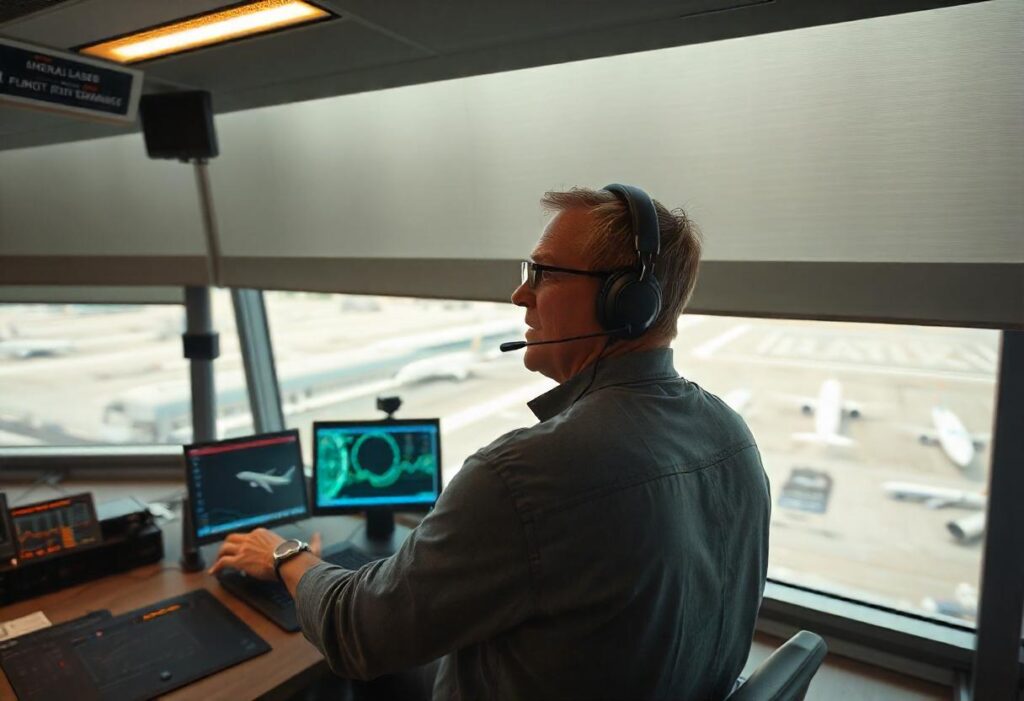Have you ever wondered who ensures that planes fly safely, land smoothly, and avoid mid-air collisions? The answer lies with the Air Traffic Controllers (ATCs)—the invisible guardians of the skies. These skilled professionals manage the complex and fast-paced world of aviation, ensuring that every flight reaches its destination without a hitch.
From directing aircraft during busy airport operations to navigating pilots through challenging weather conditions, ATCs are the backbone of aviation safety.
The job of an Air Traffic Controller isn’t just important—it’s essential. With thousands of flights operating daily across the globe, the aviation industry heavily depends on ATCs to maintain order in the skies. Their responsibilities go beyond issuing commands;
they analyze data, make split-second decisions, and solve problems in real time. Their work not only safeguards passengers and crew but also keeps the aviation industry functioning smoothly, preventing delays and ensuring efficiency.
Choosing a career in Air Traffic Control is more than just opting for a job—it’s stepping into a field that demands excellence and offers immense satisfaction. But why should someone consider this career path? What makes it stand out from other professions?
This article dives into the top 10 reasons why becoming an Air Traffic Controller could be the perfect career choice. From the thrill of high-pressure decision-making to the stability and rewards this role offers, there’s much to explore about this fascinating career.
Whether you’re passionate about aviation or simply seeking a rewarding and impactful job, Air Traffic Control might be the opportunity you’ve been looking for. So, buckle up and get ready to discover why this career could be your ticket to success.
10 Reasons to Consider a Career in Air Traffic Control
Choosing the right career is one of the most important decisions in life, and if you’re looking for a profession that combines excitement, responsibility, and excellent rewards, Air Traffic Control might be the perfect fit. As the backbone of aviation safety, Air Traffic Controllers play a crucial role in managing aircraft movement, ensuring smooth operations in the skies and on the ground.
This article explores 10 compelling reasons why a career in Air Traffic Control is not only fulfilling but also offers unique opportunities and challenges.
1. Intellectual Stimulation

In a career where every decision matters, Air Traffic Control offers an exciting mix of mental challenges and fast-paced problem-solving. It’s the perfect role for those who thrive on thinking critically and staying sharp under pressure.
If you’re someone who loves solving problems and thrives in dynamic environments, a career in Air Traffic Control offers unparalleled intellectual stimulation. This is not your average 9-to-5 desk job—every day brings unique challenges that require quick thinking and sharp decision-making.
Also Read : Doodle Art : A Step-by-Step Guide to Mastering
Also Read : 10 Fun Hobbies That Can Boost Your Mental Health
Also Read : 10 Must-Have Apps for Digital Content Creators
As an Air Traffic Controller, you’ll need to process vast amounts of information in real time, from monitoring aircraft positions to assessing weather conditions and anticipating potential conflicts. The job demands constant problem-solving and critical thinking, as you work to keep air traffic flowing smoothly while ensuring safety.
For example, you might need to reroute a plane due to a sudden thunderstorm or manage the spacing of multiple aircraft during peak hours at a busy airport.
The ability to adapt quickly to emergencies is another key aspect of this role. Whether it’s responding to an aircraft in distress or resolving unexpected delays, ATCs are trained to stay calm under pressure and make decisions that could potentially save lives. This ever-changing, high-stakes environment keeps the job exciting and mentally stimulating.
For those who enjoy tackling challenges and thinking on their feet, the intellectual rewards of this career are immense. Every shift brings new scenarios to navigate, making Air Traffic Control a profession where no two days are ever the same.
2. Job Security

A career in Air Traffic Control offers something that many professions struggle to guarantee: job security. In an era where industries face frequent disruptions and uncertainties, the aviation sector remains a cornerstone of global connectivity.
The demand for qualified Air Traffic Controllers is consistently high, as they are essential to the smooth functioning of the entire aviation system.
With air travel continuing to grow worldwide, the need for skilled professionals to manage increasing air traffic is stronger than ever. This translates to stable, long-term career prospects for those entering the field.
Once you’ve completed the necessary training and certifications, your skills become indispensable, ensuring that your career remains both valuable and secure.
Another major advantage of this profession is the low unemployment rate in the aviation sector. Governments and private aviation authorities invest heavily in maintaining a reliable workforce of Air Traffic Controllers to meet the ongoing demand.
This stability not only ensures a steady income but also offers peace of mind, knowing that your career is built on a strong and steady foundation.
For anyone seeking a role that combines importance, stability, and longevity, Air Traffic Control stands out as a highly secure and rewarding career choice.
3. Excellent Benefits

A career in Air Traffic Control not only offers intellectual challenges and job security but also comes with outstanding financial and personal benefits. ATCs are among the highest-paid professionals in the aviation sector, with competitive salaries that reflect the responsibility and expertise required for the role.
Beyond the base salary, Air Traffic Controllers often enjoy generous benefits packages. These typically include comprehensive health insurance, ensuring you and your family are well-protected. Many employers also provide robust retirement plans, allowing you to build a secure future while working in a stable and rewarding field.
Also Read : The Future of Digital Media – What Role Will AI Play in 2025?
Also Read : The Most Instagram Worthy Travel Destinations for 2025
Also Read : 10 Ways the Color Psychology in Interior Design Enhances Mood
Another perk is the potential for overtime pay and financial incentives. Due to the nature of the job, overtime shifts are often required during peak travel seasons or emergencies, which can significantly boost your overall earnings.
These financial rewards make Air Traffic Control a career that not only satisfies intellectually but also provides a high standard of living.
If you’re looking for a profession that values your skills with excellent compensation and benefits, Air Traffic Control stands out as an exceptional choice.
4. Meaningful Work
One of the most rewarding aspects of a career in Air Traffic Control is the profound sense of purpose and fulfillment it brings. ATCs hold one of the most important roles in the aviation industry, ensuring that every flight operates safely and efficiently.
The responsibility for guiding aircraft, preventing collisions, and maintaining smooth air traffic flow cannot be overstated—Air Traffic Controllers are the guardians of aviation safety.
Knowing that your decisions directly impact the safety of countless passengers and crew members provides a sense of pride that few other professions can offer. Every shift presents an opportunity to make a difference, whether it’s preventing an accident, ensuring a timely arrival, or guiding an aircraft through a complex weather situation.
Beyond the immediate impact, Air Traffic Controllers contribute to something much larger: a vital public service. The aviation industry is essential for global trade, tourism, and emergency response, and ATCs are at the heart of keeping it running smoothly. By doing your job well, you’re making a lasting contribution to society, helping millions of people travel safely each year.
If you’re someone who seeks meaningful work—where you can see the direct impact of your actions on others—Air Traffic Control offers an incredible opportunity to make a real difference in people’s lives, every single day.
5. Unique Work Environment
One of the most exciting aspects of a career in Air Traffic Control is the unique work environment. Unlike many other professions, ATCs thrive in a fast-paced and dynamic atmosphere where every moment brings new challenges and decisions. This high-stakes, stimulating environment ensures that no two days are ever the same, keeping the job fresh and engaging.
Whether you’re managing air traffic at a busy international airport or overseeing flights from a remote control center, the energy and intensity of the job make every shift feel important and rewarding.
Air Traffic Controllers also enjoy the opportunity to work in various locations. Some ATCs are stationed in control towers at airports, while others work in en-route centers that manage flights flying at higher altitudes and across large regions.
Each environment offers its own set of challenges and experiences, providing a variety of work settings within the same career field. No matter where you work, you’ll always be involved in the critical task of ensuring air traffic safety and efficiency.
Also Read : How to Think Visually: Simplify Complex Ideas with Ease
Also Read : 5 Creative Marketing Strategies for Small Businesses
Also Read : How Social Media Is Shaping Modern Trends
For those who enjoy the thrill of travel, there may also be opportunities to travel—whether it’s for training, conferences, or even international assignments. This adds another layer of excitement to the job, allowing you to explore new places while advancing your career in a globally connected field.
If you thrive in an environment where you can stay mentally sharp and enjoy diverse settings and opportunities, Air Traffic Control offers a unique and fulfilling experience that few other careers can match.
6. Continuous Learning and Development
A career in Air Traffic Control offers continuous learning and development, making it ideal for individuals who are eager to grow and expand their knowledge. As an Air Traffic Controller, you’ll never stop learning—whether it’s staying up-to-date with new technologies, improving your decision-making skills, or refining your communication techniques, there are always opportunities to enhance your abilities.
The aviation industry is constantly evolving, and ATCs are at the forefront of this change. Ongoing training is a standard part of the job, ensuring that you’re always equipped with the latest knowledge and tools to perform your duties effectively. You’ll also be regularly tested and evaluated to ensure that your skills remain sharp and relevant.
In addition to general training, there are specialization opportunities within the field of Air Traffic Control. You could choose to work in various sectors, such as radar control, where you manage aircraft at higher altitudes and over vast regions, or tower control, where you guide aircraft taking off and landing at airports.
These specialized roles require additional training but offer the chance to develop deep expertise in a particular area of ATC, adding variety and excitement to your career.
For those looking for long-term growth, career advancement within Air Traffic Control is also highly possible. Many ATCs move into supervisory or managerial roles, overseeing teams of controllers or managing large regional sectors. With experience, you can also transition into positions focused on training, safety, or operations, opening the door to even more exciting opportunities.
If you enjoy a career that promotes lifelong learning and offers a clear path for advancement and specialization, Air Traffic Control is an ideal profession where you can always continue to grow and succeed.
7. Teamwork and Collaboration

While the role of an Air Traffic Controller often seems like an individual responsibility, it is, in fact, deeply rooted in teamwork and collaboration. Every decision made in the control tower or radar room is part of a larger system of coordination between multiple parties. Effective communication and a team-oriented mindset are essential to ensure smooth operations and air safety.
Collaboration with pilots is a core part of an ATC’s daily responsibilities. Controllers provide pilots with instructions for takeoff, landing, and flight adjustments while ensuring that they have all the necessary information to navigate safely through busy airspace. Communication must be precise and clear, as even a small misunderstanding could lead to complications.
Air Traffic Controllers also work closely with other ATCs within the same facility or across different sectors. Since air traffic control spans multiple regions, collaboration between controllers in various locations is key to maintaining a seamless flow of aircraft.
For example, a controller in a tower might pass an aircraft’s details to a radar controller for further guidance, ensuring there is no disruption as the plane continues its journey. This teamwork helps manage complex air traffic scenarios efficiently, allowing for better safety and coordination.
Additionally, ATCs often collaborate with support staff who help monitor weather conditions, coordinate flight schedules, and provide technical assistance. These individuals are essential to ensuring that everything runs smoothly, and controllers rely on their expertise to make well-informed decisions.
For those who value strong team dynamics, a career in Air Traffic Control offers the opportunity to work in a highly coordinated environment where collaboration and effective communication are vital to success.
8. Work-Life Balance
One of the appealing aspects of a career in Air Traffic Control is the potential for a healthy work-life balance, though it can vary depending on the specific role and location. Unlike typical 9-to-5 jobs, Air Traffic Controllers often work in shifts, which provides a level of flexibility that many people in other fields may not have.
This shift work can be especially beneficial for those who prefer a non-traditional work schedule or want to enjoy time off during the day when others are at work.
For example, many Air Traffic Controllers work in rotating shifts, which can give them extended time off between shifts. Some may even have several days off at a time, allowing for personal projects, family activities, or travel.
These types of schedules can provide an excellent balance between career responsibilities and personal life, making it easier to juggle various commitments outside of work.
However, shift work does come with certain challenges. It can sometimes impact sleep patterns and social activities, especially for those who work during the night or on weekends. While this is a factor to consider, many ATCs find that the flexibility of the schedule allows them to balance their professional and personal lives in ways that are not possible in a typical office setting.
In addition, Air Traffic Controllers typically have the option to take vacation time and request time off for holidays, ensuring that they can still spend quality time with loved ones or take necessary breaks from the job.
If you’re someone who values having the flexibility to manage your own time, a career in Air Traffic Control can provide a strong work-life balance with the potential for personal growth and time away from the workplace.
9. Prestige and Recognition
A career in Air Traffic Control is one that commands respect and recognition due to the unique and demanding nature of the job. Air Traffic Controllers play a critical role in the safety and efficiency of air travel, and their work is highly valued by both the aviation industry and the general public.
The job’s level of responsibility is immense—ATCs are tasked with ensuring that thousands of flights take off and land without incident every day. This high level of accountability naturally comes with a certain level of prestige.
The specialized skills required to perform the role, such as quick decision-making, precise communication, and the ability to handle high-pressure situations, make Air Traffic Controllers highly respected within the aviation community.
Additionally, the nature of the job itself is inherently challenging. The ability to keep calm and make sound decisions in fast-paced, often stressful situations is a unique quality that not all professions demand. This challenging aspect not only makes the job rewarding for the individual but also commands respect from others.
People in the aviation industry and beyond recognize that Air Traffic Controllers are essential to keeping the skies safe, and their work often goes unnoticed by the public, but it is always appreciated by those who rely on air travel.
The recognition and respect that come with being an ATC contribute to a sense of pride that few other professions can offer. It’s a career that brings you to the forefront of aviation safety, and the recognition for your hard work and expertise will be felt across the industry.
If you are drawn to a role where your skills, knowledge, and dedication are truly respected, Air Traffic Control provides a prestigious career path that is as rewarding as it is important.
10. Personal Growth
A career in Air Traffic Control offers numerous personal growth opportunities, helping you to develop both professionally and personally. The unique challenges and responsibilities of the role provide a foundation for building valuable skills that extend far beyond the workplace.
One of the key areas of personal growth that Air Traffic Controllers experience is the development of strong decision-making skills. In this high-stakes environment, ATCs must make quick, accurate decisions under pressure, ensuring the safety of thousands of passengers every day.
This constant need to assess situations and act swiftly sharpens your ability to think critically and make sound judgments—skills that are transferable to many other areas of life and work.
Problem-solving is another important skill that Air Traffic Controllers develop. The ability to solve complex problems quickly and effectively is at the heart of ATC. Whether it’s managing unexpected changes in weather, adjusting flight paths, or handling an emergency, ATCs are constantly faced with challenges that require creative solutions.
This experience builds confidence in your problem-solving abilities and helps you stay calm in difficult situations.
In addition to decision-making and problem-solving, leadership skills are another area in which ATCs grow. As an Air Traffic Controller, you’re not just following instructions—you’re taking charge of a situation and guiding pilots and your team members through potentially stressful scenarios.
Over time, this experience fosters leadership qualities, such as the ability to manage people, communicate effectively, and handle responsibility. These skills can open doors to future opportunities in management or training roles, giving you a chance to lead others in the aviation industry.
Ultimately, the personal growth that comes with being an Air Traffic Controller is invaluable. The development of decision-making, problem-solving, and leadership abilities equips you with skills that are highly respected both within and outside of the aviation field. If you’re looking for a career that will continuously challenge you and help you grow as a person, Air Traffic Control offers an ideal environment for achieving just that.
What are the main challenges faced by air traffic controllers
Air traffic controllers have a really important job keeping airplanes and passengers safe, but it’s not always easy. They face some big challenges every day at work. Let’s talk about some of the main problems they deal with:
One of the biggest issues is that there’s just so much work to do and not always enough people to do it. Imagine if your teacher gave your whole class a bunch of homework, but half the students were out sick. That’s kind of what it’s like for air traffic controllers sometimes.
There aren’t enough trained controllers to handle all the airplanes flying around. This means the controllers who are working have to do extra work and can get really tired. When people get too tired or stressed, they might quit their jobs, which makes the problem even worse for those left behind.
Also Read : ACHR Stock: Trends and Predictions for 2025
Also Read : Best Travel Apps to Make Your Trip Hassle-Free in 2025
Also Read : Top 10 Destinations for Solo Travel Adventures In 2025
Another tricky part of being an air traffic controller is dealing with all the fancy equipment they use. Sometimes the equipment doesn’t work right or needs to be updated. It’s like trying to play a video game with an old controller that doesn’t always do what you want it to. Controllers need good radar systems to see where planes are, but not all airports have the best equipment.
Some airports also don’t have enough space for all the planes on the ground, which can make things confusing and crowded.
Weather is another big challenge. Bad storms, thick fog, or heavy snow can make it hard for planes to take off, land, or fly safely. Air traffic controllers have to figure out how to keep everyone safe when the weather gets nasty. It’s kind of like being a crossing guard during a rainstorm – you have to be extra careful to make sure everyone gets where they’re going without any accidents.
Air traffic controllers also have to stay awake and pay attention for long periods of time. Imagine if you had to sit and do math problems for hours without getting distracted – that’s a bit like what controllers do, except their math problems are about keeping planes from bumping into each other!
It can be really tiring and stressful. Sometimes controllers don’t get enough breaks or time to rest between shifts, which can make them feel worn out.
Lastly, there are new things popping up that make the job even more complicated. Bad people might try to hack into the computers that help control air traffic, so controllers have to be on the lookout for that too. There are also new technologies coming out all the time, like robots and artificial intelligence, that controllers need to learn how to use and trust.
All of these challenges make the job of an air traffic controller pretty tough. But they work hard every day to overcome these problems and keep everyone who flies safe and sound. It’s important for airports, airlines, and the government to help controllers by giving them the tools, training, and support they need to do their job well.
What kind of training is required to become an air traffic controller
Becoming an air traffic controller requires extensive training that typically involves several stages:
Initial Education
Most aspiring air traffic controllers start by completing one of these options:
- A bachelor’s degree from a school approved by the Federal Aviation Administration’s (FAA) Air Traffic Collegiate Training Initiative (AT-CTI)
- A four-year degree in any field
- Three years of progressively responsible work experience
- A combination of education and work experience totaling three years
FAA Academy Training
After meeting the initial requirements and passing necessary tests, candidates attend the FAA Academy in Oklahoma City for intensive training:
- This training lasts about 2 to 5 months, depending on experience
- It includes classroom instruction and practice on air traffic control simulators
On-the-Job Training
Upon completing the FAA Academy, new controllers are assigned to a facility where they continue their training:
- This phase can take 2 to 4 years to become fully certified
- Trainees work as “developmental controllers” during this time
- They must meet certification requirements for all positions in their assigned facility
Ongoing Training and Certification
Air traffic controllers must:
- Pass regular performance tests (twice a year)
- Maintain their certification through ongoing training
- Pass annual medical examinations
The entire process of becoming a fully certified air traffic controller typically takes between 5 to 8 years, depending on the individual’s path and progress.
Conclusion
In conclusion, a career in Air Traffic Control offers numerous benefits and opportunities for those who are up for a challenge. From intellectual stimulation and job security to excellent benefits and the chance for personal growth, the reasons to consider this profession are clear.
Whether it’s the prestige of the job, the meaningful work of ensuring aviation safety, or the continuous learning that keeps the job fresh and exciting, Air Traffic Control offers a fulfilling career path for those who are ready to take on its challenges.
However, it’s important to keep in mind that the path to becoming an Air Traffic Controller requires dedication and preparation. To succeed in this field, you must meet the rigorous physical and mental demands of the job, such as maintaining high levels of concentration, decision-making skills, and the ability to handle stressful situations.
It’s a career that requires not only technical expertise but also strong personal qualities like focus, teamwork, and the ability to remain calm under pressure.
If you’re interested in pursuing this exciting career, make sure to research the specific requirements and application process for becoming an Air Traffic Controller. Understand the training programs, qualifications, and potential challenges, so you can fully prepare yourself for the journey ahead.
By taking the first step toward a career in Air Traffic Control, you can be part of an essential, respected profession that plays a critical role in aviation safety and brings great rewards both professionally and personally.
Are you ready to take the first step toward a rewarding career in Air Traffic Control? If this profession piqued your interest and you want to learn more, it’s important to explore the available resources and get a clearer understanding of the application process.
Start by visiting the official website of the aviation authority in your region for the most accurate and up-to-date information. For those in the United States, the Federal Aviation Administration (FAA) website is a great place to begin.
You can learn about training programs, certification requirements, and career opportunities within the field of Air Traffic Control. Visit the FAA’s official website here for more details.
Additionally, here are some helpful resources to guide your research:
- Websites offering detailed insights into ATC training and career paths.
- Online forums and discussion boards where current and aspiring ATCs share their experiences and advice.
- Job listings and internship opportunities related to Air Traffic Control.
Frequently Asked Questions (FAQ)
Q: What qualifications do I need to become an Air Traffic Controller?
A: You must typically have a high school diploma or equivalent. In many regions, you’ll need to complete specific training programs and pass exams to earn your certification.
Q: How long does the training process take?
A: The length of training can vary depending on the location and your previous experience. Generally, it can take several months to a year, including both classroom education and on-the-job training.
Q: Is there a lot of stress in this profession?
A: Yes, Air Traffic Control can be stressful, especially during peak hours or when managing complex situations. However, the ability to handle stress and make quick decisions is a skill that develops over time with experience and training.
Q: Can I work as an Air Traffic Controller abroad?
A: Yes! Many countries have similar roles, but you’ll need to meet the specific certification and licensing requirements of the country where you want to work.
For more information on starting your career in Air Traffic Control, don’t hesitate to reach out to aviation authorities or connect with professionals in the field who can provide valuable guidance.
Take the next step and see where this exciting career path can take you!


